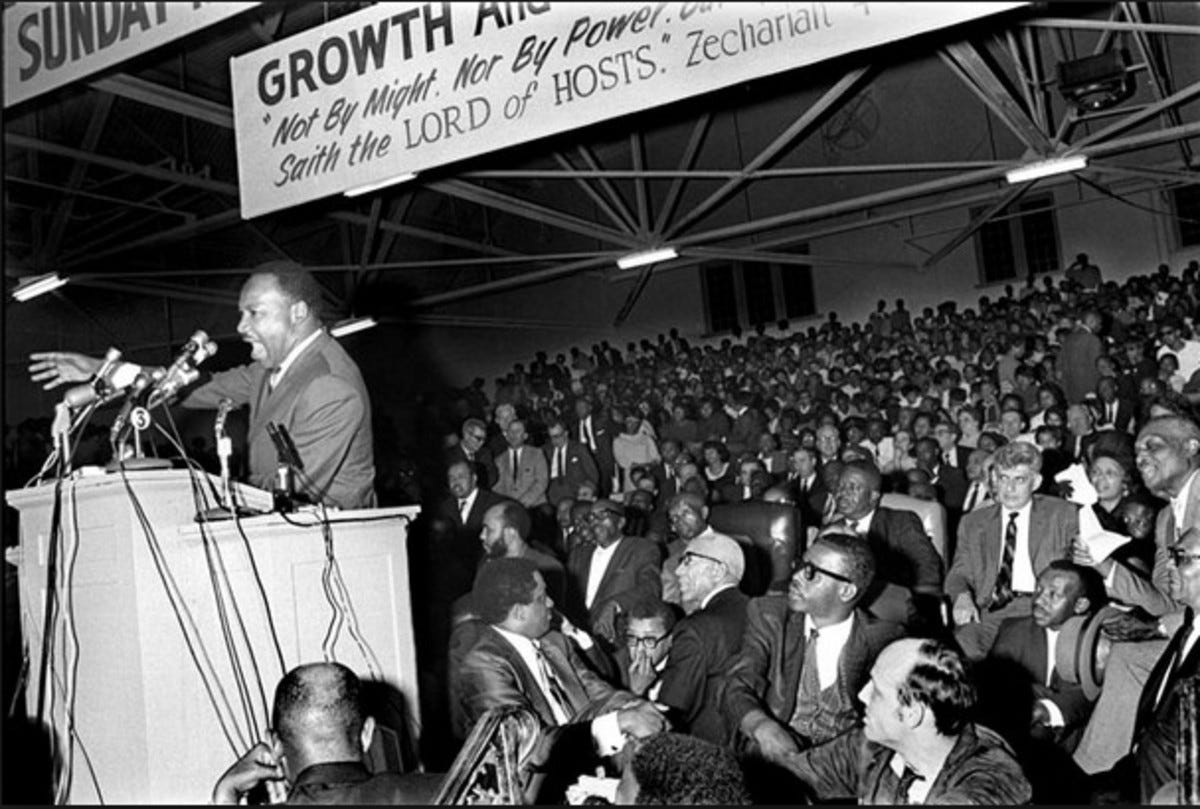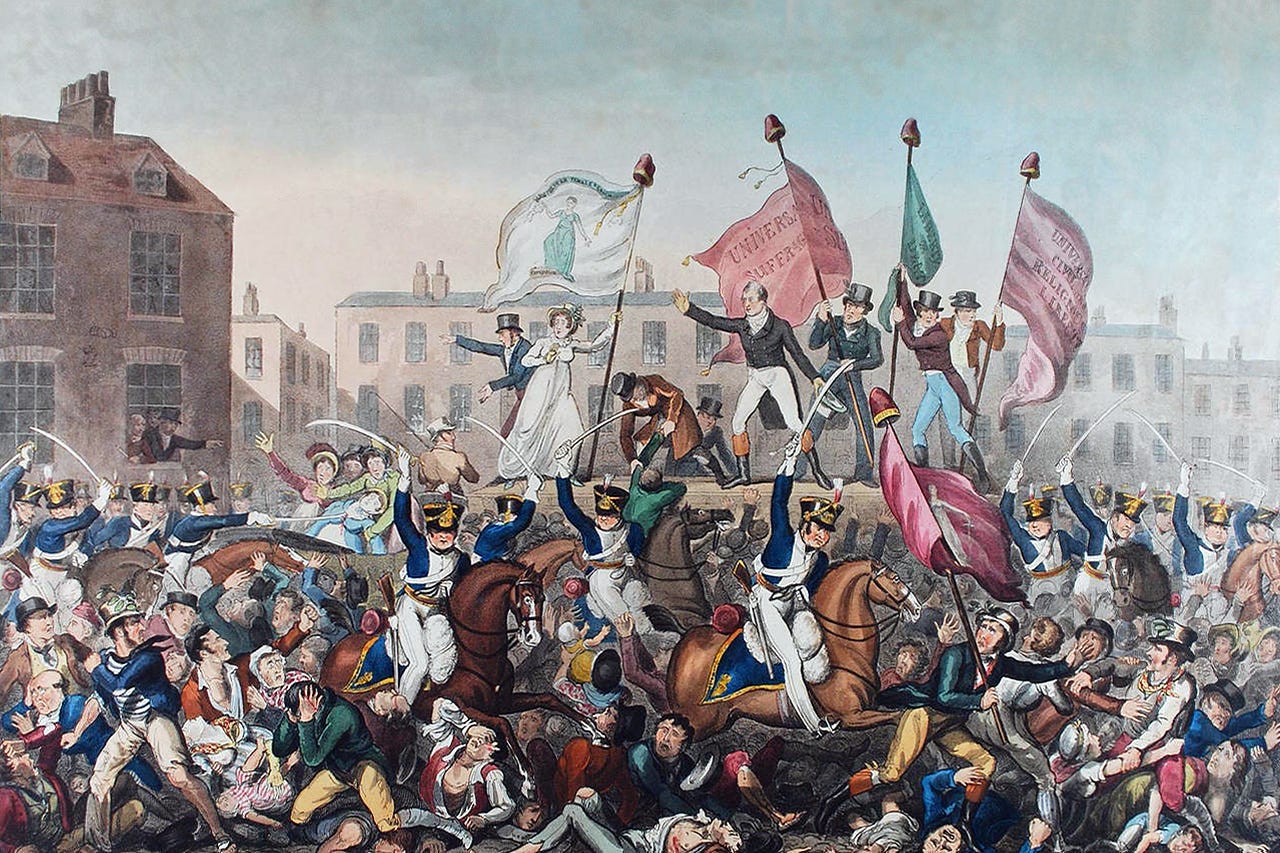Welcome back to Culture Club, a feature where David and I write about what we’ve been reading, watching, playing, and listening to, for paid subscribers. Please enjoy this free preview, and consider upgrading to support two struggling journalists at once! — Talia
This Labor Day, many Americans will be enjoying a day off work, plenty more will be traveling home, and one I know will be celebrating a birthday (Happy Birthday Talia!) But I doubt that too many Americans will be giving much thought to the labor movement itself (my own Labor Day thoughts are usually focused on my fantasy football draft.)
But in a lot of ways this has felt like a Summer of Labor. Hollywood’s striking actors and writers have gotten most of the attention, but all over America workers have been coming together to fight for their collective rights. So, for this Sunday’s newsletter I’ve selected some of the greatest, most iconic, and most influential speeches in the history of the labor movement.
Workers have been working for as long as humans have been human, of course, and I only go back to medieval England, when John Ball addressed the Peasants Revolt in 1381. From there, I jump ahead to the 19th century and the Peterloo Massacre, the Communist Manifesto, and the birth of the American labor movement. In the 20th century we have speeches from Mother Jones, Emma Goldman, Martin Luther King, Cesar Chavez, and more.
The stories of this century’s heroes are still being written, but this Labor Day is a good chance to celebrate those who came before, and to pay tribute to the workers of today.
John Ball
“Cast Off the Yoke of Bondage”
June 12, 1381, Blackheath, England
When Adam delved and Eve span, Who was then the gentleman? From the beginning all men by nature were created alike, and our bondage or servitude came in by the unjust oppression of naughty men. For if God would have had any bondmen from the beginning, he would have appointed who should be bond, and who free. And therefore I exhort you to consider that now the time is come, appointed to us by God, in which ye may (if ye will) cast off the yoke of bondage, and recover liberty.
Henry Hunt
“To the Inhabitants of Manchester and Neighbourhood”
August 11 1819, Peterloo, England
The eyes of all England, nay, of all Europe, are fixed upon you; and every friend of real Reform and of rational Liberty, is tremblingly alive to the result of your Meeting on Monday next.
Our enemies will seek every opportunity by the means of their sanguinary agents to excite a Riot, that they may have a pretense for spilling our blood, reckless of the awful and certain retaliation that would ultimately fall on their heads.
Every friend of real and effectual reform is offering up to Heaven a devout prayer, that you may follow the example of your brethren of the Metropolis; and by your steady, patient, persevering, and peaceable conduct on that day, frustrate their HELLISH AND BLOODY PURPOSE.
Karl Marx
Inaugural Address of the International Working Men’s Association
October 21, 1864, London, England
If the emancipation of the working classes requires their fraternal concurrence, how are they to fulfill that great mission with a foreign policy in pursuit of criminal designs, playing upon national prejudices, and squandering in piratical wars the people’s blood and treasure? It was not the wisdom of the ruling classes, but the heroic resistance to their criminal folly by the working classes of England, that saved the west of Europe from plunging headlong into an infamous crusade for the perpetuation and propagation of slavery on the other side of the Atlantic.
The fight for such a foreign policy forms part of the general struggle for the emancipation of the working classes.
Proletarians of all countries, unite!
Samuel Gompers
“What Does the Working Man Want?”
May 1, 1890, Louisville, KY
What we want to consider is, first, to make our employment more secure, and, secondly, to make wages more permanent, and, thirdly, to give these poor people a chance to work. The laborer has been regarded as a mere producing machine ... but back of labor is the soul of man and honesty of purpose and aspiration. Now you cannot, as the political economists and college professors, say that labor is a commodity to be bought and sold. I say we are American citizens with the heritage of all the great men who have stood before us; men who have sacrificed all in the cause except honor ... I say the labor movement is a fixed fact. It has grown out of the necessities of the people, and, although some may desire to see it fail, still the labor movement will be found to have a strong lodgment in the hearts of the people, and we will go on until success has been achieved!
Mother Jones
Speech to Striking Coal Miners
August, 15, 1912, Charleston, WV
The miners are close to me. The steel workers are. I go among them all. One time when I took up the Mexican question, I went to Congress to save some lives; I had never seen them in my life, but they appealed to me and said, “It is up to you, Mother, to save our lives.” I went up to carry the matter to Congress. It came up before the big committee. They were Dalzell, Congressmen, representing the Steel Trust — he was chairman of that big committee; Smith, representing the Southern Pacific Railroad, was a member of that committee; Champ Clark also was a member of that committee. Dalzell said to me, “Mother Jones, where do you live?” I said, “In the United States, sir.” “What part of the United States?” said he. I said, “Wherever the workers are fighting the robbers, there am I. Sometimes I am in Arizona fighting the Southern Pacific blood-sucking pirates and thieves,” said I. “Sometimes, I am up on the Steel Range, fighting those murderers and plunderers, sometimes I am in Pennsylvania fighting the robbers and murderers and blood-suckers there, and by the Eternal God we will clean you up and put you out of business.”
Keep reading with a 7-day free trial
Subscribe to The Sword and the Sandwich to keep reading this post and get 7 days of free access to the full post archives.






